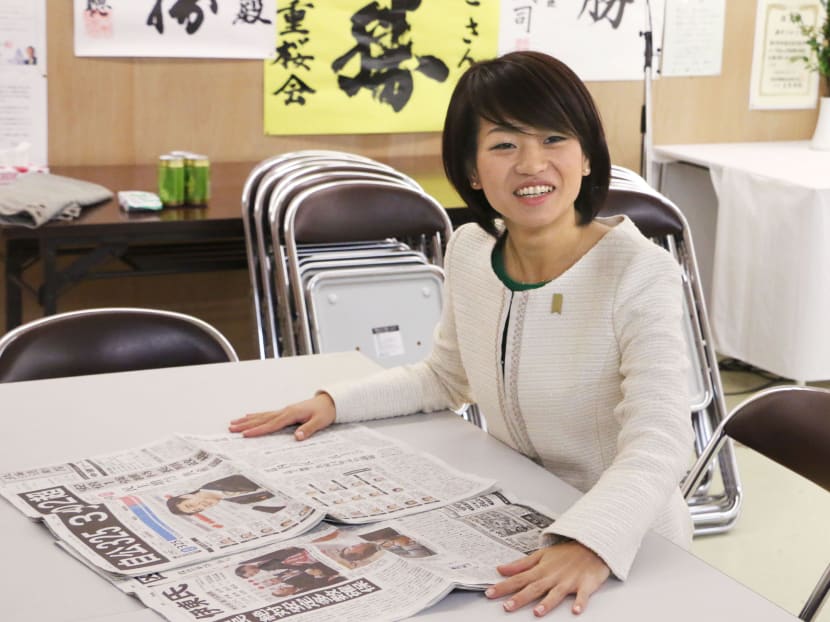Female lawmakers in Japan still face discrimination over pregnancy
TOKYO — It is becoming more common for female employees to take maternity leave in Japan, but female politicians still get taunted even for becoming pregnant. In a recent blog post, independent House of Representatives lawmaker Takako Suzuki, 31, announced that she was pregnant with her first child, saying she had been “blessed with the gift of a new life”.

Ms Takako Suzuki, who ran in the general election on the ticket of the opposition Democratic Party of Japan, meets with reporters in the northeastern city of Kushiro on Dec. 15, 2014, a day after securing her lower house seat under the proportional representation system, although she was defeated in the single-seat electoral district. Source: Kyodo
TOKYO — It is becoming more common for female employees to take maternity leave in Japan, but female politicians still get taunted even for becoming pregnant. In a recent blog post, independent House of Representatives lawmaker Takako Suzuki, 31, announced that she was pregnant with her first child, saying she had been “blessed with the gift of a new life”.
But she felt “very conflicted” since she had been prescribed bed rest by her doctor due to the risk of a premature birth. This meant, she said, that she would cut back on her political activities.
Ms Suzuki’s post attracted congratulatory messages as well as a torrent of abuse. “I have doubts about (your) getting pregnant while you are still serving in office,” one person wrote. “You should quit for the time being,” remarked another, while someone else wrote, “This is why female lawmakers are a problem ...”.
Ms Suzuki responded that she found it unacceptable that people think that just because she is pregnant, she is somehow “abandoning her duties” as a representative of the people. Ms Suzuki, who said she is due to give birth in mid-September, is not the only female Diet member to have been abused for daring to have a child.
In one example, the Mainichi Shimbun reported that Ms Hiromi Suzuki, 33, a member of Tokyo’s Shinjuku Ward Assembly, took four months’ maternity leave four years ago, and again last year. During her first leave, sexually vulgar insults were scrawled over her posters, and she was called a “traitor” and urged to “quit” on social media.
In another example of how dismissive the public can be is seen in the case of Ms Megumi Kaneko, a 39-year-old House of Representatives lawmaker from the Liberal Democratic Party (LDP) who gave birth to a son in February last year. A person who saw her cradling her son in her home district in Niigata Prefecture told her: “You’re done as a politician.” That prompted Ms Kaneko to observe: “In politics, I (feel) like a prejudice remains that it is something only for men.”
For years the Japanese government has been touting the goal of increasing the number of women in senior jobs, in both the private and public sectors. A target has been set to raise the proportion of women in politics to 30 per cent by 2020, but female lawmakers currently make up just 13 per cent of the Diet.
In Japan’s House of Representatives, where Prime Minister Shinzo Abe’s LDP holds a majority, women hold just 44 seats, or 9.3 per cent of the 475 seats in the chamber.
From an international perspective, female participation in government is poorly represented.
According to a survey conducted earlier this year by the Geneva-based Inter-Parliamentary Union, Japan ranked 163rd out of 193 countries in terms of female lawmakers in the more powerful lower chamber. It also ranked the lowest among Group of Seven countries.
Quota systems to enhance women’s candidacy in elections have been implemented overseas, and there are also examples of systems to allow female lawmakers to take maternity or childcare leave by bringing in surrogates to stand in their place.
There are no such systems established in Japan. Moreover, the law does not regard politicians as workers. The Labour Standards Act also does not extend to politicians because they are not considered workers subject to industrial relations. Maternity leave was granted for the first time only in 2000, when the absence of LDP House of Councillors lawmaker Seiko Hashimoto from Diet sessions to give birth to her child prompted the Diet to allow maternity leave. According to the executive offices of both chambers of the Diet, a total of 11 legislators have made use of the system.
Ms Hiroko Miyashita, the representative director of a non-profit organisation for mothers, said that Japanese society is too “close-minded”.
Her non-profit organisation, Matahara Net, is so named as it supports women who suffer harassment in the workplace after becoming pregnant or giving birth, or “matahara’’ (maternity harassment) in Japanese.
“Policies should reflect diverse thinking, and the perspective of female lawmakers who have experienced childbirth and childcare is essential,” she said. Japan has to have a society where women can continue working “whatever their profession might be”.
The pace of change is picking up in the private sector, even though women are still grossly under-represented in leadership roles.
For instance, retail giant Aeon Co is aiming to boost its proportion of women managers to 50 per cent by 2020.
Although the male-to-female ratio was split evenly when hiring new employees with similar abilities, many began to question why there was such a big difference at the managerial level.
For the past four years, the company has been trying to figure out ways to incentivise women to remain in their jobs.
Due to these efforts, the company said, all of its female employees at its headquarters in Chiba, near Tokyo, have been able to take childcare leave and return to their jobs.
“We have encouraged men to engage in child-rearing, too. Regardless of gender, we want our employees to work for many years,” said a company spokesperson. KYODO






